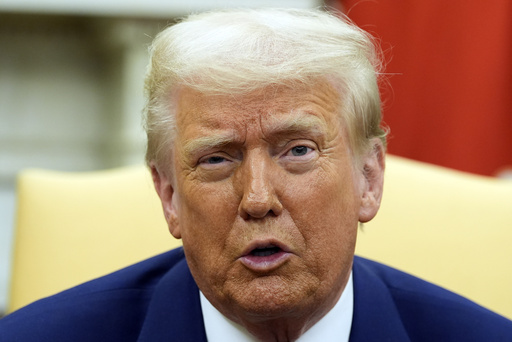
President Donald Trump raised eyebrows by questioning a well-documented aspect of Senate Minority Leader Mitch McConnell’s past — his childhood struggle with polio — following the Kentucky Republican’s opposition to vaccine skeptic Robert F. Kennedy Jr.’s appointment as the nation’s chief health officer this past Thursday.
Trump criticized McConnell’s mental capacity, claiming he had “no idea” about the senator’s experience with polio. This exchange highlights the fractured relationship between the former president and the longtime Senate leader. Though they collaborated effectively on tax reforms and judicial nominations during Trump’s initial term, their rapport deteriorated after McConnell attributed blame to Trump for the “shameful” events of the January 6, 2021, Capitol riot, which resulted in Trump making personal jabs at McConnell and his family.
McConnell’s office did not respond to Trump’s remarks immediately. Earlier, McConnell had publicly identified himself as a polio survivor, emphasizing the crucial role that vaccines played in his life, which underlined his resistance to Kennedy’s confirmation. In a statement, McConnell firmly stated, “I will not condone the re-litigation of proven cures, and neither will millions of Americans who credit their survival and quality of life to scientific miracles.”
Among Senate Republicans, McConnell stood out as the sole “no” vote against Kennedy. He also previously opposed Trump’s selections for key positions, such as the Pentagon chief and the director of national intelligence. Although McConnell had supported several other nominees from the Trump administration, the former president fixated on the senator’s dissent regarding crucial appointments.
Trump expressed that McConnell “votes against almost everything now,” labeling him as “a very bitter guy.” The president remarked that he felt pity for McConnell, insinuating that the senator wished to retain his post as Senate GOP leader primarily due to his fundraising abilities, which Trump claimed anyone in such a role could achieve. Trump’s comments suggested McConnell lacked mental acuity, asserting, “He wasn’t equipped mentally ten years ago, in my opinion. He let the Republican Party go to hell.” Trump suggested that McConnell’s vote against Kennedy indirectly represented a vote against him personally.
When a reporter reminded Trump about McConnell’s childhood polio, he responded, “I don’t know anything about he had polio,” and when pressed if he doubted the senator’s struggle with the disease, Trump stated, “I have no idea if he had polio. All I can tell you about him is that he shouldn’t have been leader.” McConnell was diagnosed with “acute poliomyelitis” at the age of two and received treatment at the polio rehabilitation facility in Warm Springs, Georgia, established by President Franklin D. Roosevelt.
During his recovery, a rigorous physical therapy regimen was implemented for two years. Doctors advised against letting him walk, believing it would hinder his recovery; however, his mother took it upon herself to conduct physical therapy exercises four times daily for 45 minutes each. Eventually, doctors anticipated that he could lead a normal life. Nonetheless, McConnell faced challenges with running, which limited his athletic activities. By 1985, he began to notice increased weakness in his affected left leg, leading to numerous falls, one of which resulted in a severe concussion. These recent issues align with symptoms of what has been diagnosed as “post-polio syndrome.”
In a vulnerable moment during a 2020 interview, McConnell reflected on how fortunate he felt to have a mother determined to help him regain mobility. He credited his mother’s tenacity, hard work, and persistence as foundational principles that have guided his life. “My mother instilled all that in me before I was four years old and I think it’s been a guiding principle in how I lead my life,” he stated.
On Thursday, McConnell explained that his opposition to Kennedy’s confirmation stemmed from a desire for the nation to have a health leader “who is willing to acknowledge without qualification the efficacy of life-saving vaccines.” In light of this, Trump announced that Kennedy would spearhead a new commission focused on revitalizing the nation’s health.
Maintaining his pragmatic approach, McConnell offered some advice to Kennedy: “As he takes office, I sincerely hope Mr. Kennedy will choose not to sow further doubt and division but to restore trust in our public health institutions.”

